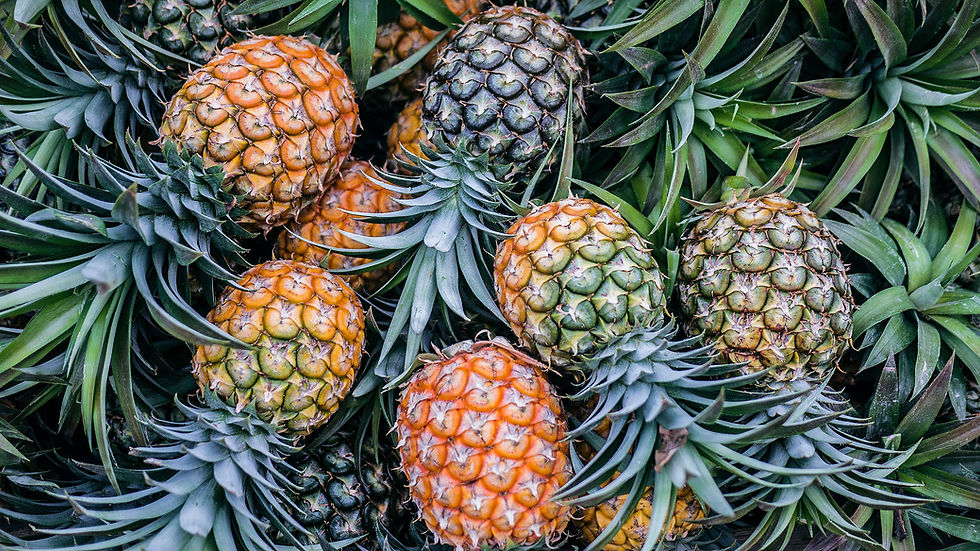Unleashing the Taste of the Tropics: The Mauritius Paynapple
- Triplet 59
- May 22, 2023
- 3 min read
Updated: Feb 21, 2024
The Mauritius Paynapple
The vibrant island of Mauritius, renowned for its diverse cultures and remarkable landscapes, also possesses a robust and unique culinary heritage. As with its food, the island's beverages are as captivating and distinctive, a beautiful melange of different influences, resulting in something truly exceptional. One such beverage is the Mauritius Paynapple - a delightful drink brewed from fermented pineapple. This delicious drink is an embodiment of the island's tropical spirit, with its fruity, tart flavor profile and underlying sweetness.
Let's dive into the making of this unique Mauritian beverage and embark on a tropical journey, right in your kitchen!

Ingredients:
1 ripe pineapple
2 litres of water
2 cups of sugar (you can adjust this to your preferred sweetness)
1/2 cup of lemon juice
1 teaspoon of yeast (preferably champagne yeast for its resilience and neutral flavour)
Equipment:
A large, clean jar with a tight lid (around 3-litre capacity)
A cheesecloth or fine mesh strainer
A plastic funnel
Glass bottles for storage

Instructions:
Prepare the Pineapple: Peel the pineapple and cut it into chunks, discarding the core. Ensure to save the peel, as it contains natural yeast that will aid in the fermentation process. Rinse the pineapple chunks and peels thoroughly under running water to remove any potential contaminants.
Prepare the Sugar Solution: In a large pot, bring the water to a boil and add the sugar. Stir until the sugar is fully dissolved, then remove from heat. Allow the solution to cool completely.
Begin Fermentation: In your clean jar, add the pineapple chunks, peels, and the cooled sugar solution. Add the lemon juice and sprinkle the yeast over the top. Stir the mixture gently with a clean spoon to combine all the ingredients.
Cover and Ferment: Cover the jar with its lid loosely, allowing gases produced during fermentation to escape. Leave the jar in a cool, dark place for about 7-10 days. You should start to see bubbles appearing after the first few days - a sign that fermentation is happening.
Strain and Bottle: After 7-10 days, strain the fermented pineapple liquid through a cheesecloth or fine mesh strainer into a clean container, discarding the pineapple chunks and peels. Use a funnel to pour the Paynapple into glass bottles, leaving some space at the top.
Second Fermentation (Optional): For a fizzy Paynapple, perform a second fermentation. Seal the bottles tightly and leave them at room temperature for 2-3 days. The sugar in the liquid will continue to ferment, producing carbon dioxide and adding a natural fizz to your beverage. Be careful during this process, and “burp” the bottles once a day by opening them slightly to release pressure.
Refrigerate and Enjoy: Place the Paynapple in the refrigerator to stop the fermentation process and cool before serving. It's best enjoyed chilled!
Remember, fermentation is as much an art as it is a science. If your Paynapple doesn't taste right or smell right, it might be best to start over. But once you've successfully created your batch, you'll have a taste of the Mauritius island right at home. Enjoy the fruity, tangy, and mildly sweet flavor of the Paynapple, and share this unique Mauritian beverage with friends and family!
#MauritiusPaynapple, #FermentedDrinks, #MauritianCuisine, #TropicalBeverages, #HomeBrewing, #PineappleRecipes
Proudly Promoting Mauritius:
We are delighted to work together in promoting the beauty and opportunities of Mauritius.
Our websites, Mauritius Life, Veri Global, and Property Finder, are committed to providing valuable information, resources, and services related to Mauritius, its culture, economy, real estate, and more.
Please explore our websites to discover the rich cultural heritage, breathtaking beaches, thriving economy, top-notch real estate listings, investment administration, and knowledge that Mauritius has to offer. Together, we aim to showcase the best of Mauritius and assist you in making informed decisions about living, investing, and experiencing all that this beautiful island has to offer.



































Comments